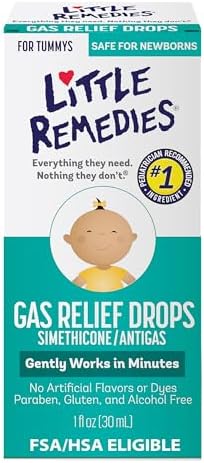Bringing a new baby home is a joyous occasion, but it can also be filled with challenges. One of the most distressing experiences for new parents is dealing with a baby who cries inconsolably for extended periods. This could be a sign of colic, a condition that affects many infants and leaves parents feeling helpless and exhausted. Let’s delve into what colic is, how to recognize it, and what you can do to help your baby (and yourself) through this trying time.
What Exactly is Colic?
Colic is defined as frequent and intense crying in a healthy infant.(NewYork-Presbyterian) It’s important to understand that crying is normal for babies; it’s their primary way of communicating their needs.
However, a colicky infant cries more frequently and for longer durations than what is considered typical. The key features of infantile colic are periods of inconsolable crying, irritability, and screaming that last for 3 hours or more without an apparent cause.(Infantile Colic – StatPearls – NCBI Bookshelf)
How is Colic Defined?
While the exact definition can vary slightly, the generally accepted “rule of threes” is often used: crying for more than 3 hours a day, more than 3 days a week, for more than 3 weeks in an otherwise healthy baby. It’s crucial to remember that colic is a diagnosis of exclusion, meaning other potential causes for the crying must be ruled out first.
What are the Common Symptoms of Colic?
Beyond the excessive crying, several other symptoms may indicate colic:
- Intense crying spells: The crying often comes on suddenly and for no apparent reason.
- Inconsolability: The baby is difficult to soothe, no matter what you try.
- Physical signs: Clenched fists and legs curled up over their tummy are common.(Colic: Symptoms, Causes & Treatment – Cleveland Clinic)
- Red face: The baby’s face may become flushed during crying episodes.
- Predictable timing: Colic often occurs in the late afternoon or evening.
It’s important to note that despite the fussiness and crying, babies with colic typically continue to eat well and gain weight.(Colic: Symptoms, Causes & Treatment – Cleveland Clinic)
What Causes Colic in Babies?
The exact cause of colic remains a mystery, which can be frustrating for parents seeking answers. Doctors don’t know exactly what causes colic.(Colic in Babies: Possible Causes, Remedies, and Tips – WebMD) It might be a sign that your baby is having a hard time getting used to being in the world.(Colic in Babies: Possible Causes, Remedies, and Tips – WebMD) Many proposed contributing factors, such as biological, gastrointestinal, and psychosocial elements, define colic causes.(Infantile Colic – StatPearls – NCBI Bookshelf) Several theories exist, but none have been definitively proven. Some of the potential contributing factors include:
Gastrointestinal Factors
- Gas: While gas is often blamed, it’s unclear whether gas is a cause or a result of the crying. Simethicone gas drops may help relieve gas.(Colic: Symptoms, Causes & Treatment – Cleveland Clinic)
- Immature digestive system: A baby’s digestive system is still developing, which may lead to difficulty digesting food and increased sensitivity.
- Food sensitivities or allergies: In some cases, colic may be related to a sensitivity to something in the baby’s formula or the mother’s diet (if breastfeeding). A maternal low-allergens diets (ie, low in dairy, soy, egg, peanut, wheat, shellfish) may offer relief from excessive crying in some infants.(Colic Treatment & Management: Medical Care, Diet, Prevention)
Environmental and Psychological Factors
- Overstimulation: Babies can easily become overstimulated by their environment, leading to fussiness and crying.
- Temperament: Some babies are simply more sensitive or have a harder time self-soothing.
- Stress or anxiety: Although babies are not consciously stressed, tension in the household may affect the baby.
Other Potential Causes
- Early migraines: Some researchers believe that colic may be a form of early migraine in infants.
- Nicotine exposure: Babies exposed to nicotine in utero or through breast milk may be more prone to colic.
How Can I Treat and Cope with Colic?
While there’s no magic cure for colic, there are several strategies you can try to soothe your baby and cope with the stress of dealing with a colicky infant.
Soothing Techniques
- Swaddling: Swaddling your baby in a large, thin blanket can help them feel secure and warm.(Colic Relief Tips for Parents – HealthyChildren.org)
- Skin-to-skin contact: Holding your baby skin-to-skin can be very comforting.(Colic in Babies – How to Treat and Cope | familydoctor.org)
- Movement: Gentle rocking, swaying, or taking your baby for a walk in a stroller can be soothing.
- White noise: Playing white noise, such as a fan, vacuum cleaner, or white noise machine, can help block out other sounds and create a calming environment.* Warm bath: A warm (not hot) bath can sometimes help to relax a colicky baby.(Colic in Babies – How to Treat and Cope | familydoctor.org)
- Baby massage: You can also try some baby massage strokes that help with colic.(Colic Relief Tips for Parents – HealthyChildren.org)
Feeding and Diet Adjustments
- Burp frequently: Make sure to burp your baby frequently during and after feedings to help release any trapped gas.
- Consider dietary changes (if breastfeeding): If you’re breastfeeding, talk to your doctor about whether eliminating certain foods from your diet, such as dairy, caffeine, or spicy foods, might help.
- Try a different formula: If you’re formula-feeding, your doctor may recommend trying a different type of formula, such as a hypoallergenic formula.
Medications and Remedies
- Simethicone drops: Over-the-counter simethicone gas drops can help relieve gas.(Colic: Symptoms, Causes & Treatment – Cleveland Clinic)
- Probiotics: Some studies suggest that probiotics may help reduce crying in colicky infants.
- Avoid homeopathic mixtures: Doctors don’t recommend naturopathic or homeopathic mixtures to treat colic, because there’s no evidence to say they work or are safe for young babies.(Colic in babies: what it is & what to do | Raising Children Network)
Self-Care for Parents
- Take breaks: It’s essential to take breaks when you’re feeling overwhelmed. Ask your partner, a family member, or a friend to watch the baby so you can get some rest.
- Practice self-care: Make time for activities you enjoy, such as reading, taking a bath, or going for a walk.
- Seek support: Talk to your partner, friends, family, or a therapist about your feelings. Joining a support group for parents of colicky babies can also be helpful.### When to See a Doctor
While colic is generally harmless, it’s important to rule out other potential causes for your baby’s crying. Contact your doctor if:
- Your baby has a fever.
- Your baby is vomiting.
- Your baby has diarrhea or bloody stools.
- Your baby is not eating well or gaining weight.
- Your baby’s crying or behavior changes suddenly.(Colic in Babies – How to Treat and Cope | familydoctor.org)
- You are concerned about your baby’s health for any reason.
Dealing with a colicky baby can be incredibly challenging, but remember that it’s not your fault, and you’re not alone. Colic is a temporary condition that typically resolves on its own by the time the baby is 3-4 months old. In the meantime, focus on providing comfort and support to your baby, and don’t hesitate to seek help when you need it.
FAQs About Colic
No, colic is not a reflection of your parenting skills. It’s a common condition that affects many babies, regardless of how well they are cared for.
Colic usually starts in the first few weeks of life and typically resolves by the time the baby is 3-4 months old.
Unfortunately, there’s no known way to prevent colic.
Colic is not associated with any long-term health problems.
If your baby’s crying is accompanied by other symptoms, such as fever, vomiting, diarrhea, or poor feeding, or if you’re concerned about your baby’s health for any reason, contact your doctor.
References:
- (Colic: Symptoms, Causes & Treatment – Cleveland Clinic)
- (Colic in Babies – How to Treat and Cope | familydoctor.org)
- (Infantile Colic – StatPearls – NCBI Bookshelf)
- (Colic: Symptoms & Causes | NewYork-Presbyterian)
- (Colic Relief Tips for Parents – HealthyChildren.org)
- (Colic Treatment & Management: Medical Care, Diet, Prevention)
- (Colic in babies: what it is & what to do | Raising Children Network)
- (Colic in Babies: Possible Causes, Remedies, and Tips – WebMD)
I’m Cris Coelho, and motherhood has transformed my life!
As a speech therapist and early childhood educator, I’ve always been passionate about child development. But it was becoming a mother that truly opened my eyes to the real challenges and joys of this journey.
Here at Materníssima, I share everything I’ve learned — blending professional knowledge, real-life experience, and a heartfelt touch.
You’re very welcome here! 💕








